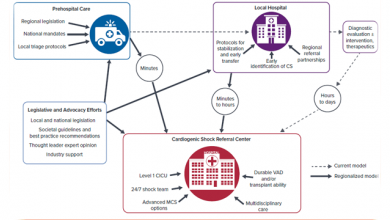Search results
Author(s):
Nathan T Glusenkamp
,
William J Oetgen
,
Brendan Mullen
Added:
3 years ago
The past decade has seen impressive advances in cardiovascular (CV) care and reductions in patient mortality from CV disease (CVD). Between 1997 and 2007 (the year for which most recent final data are available), the death rate from CVD declined by 27.8 %. The actual number of CVD deaths per year declined by 14.2 % over this period. Meanwhile, the death rate for stroke fell by 44.8 % in the same…
View more
Author(s):
Kari Gorder
,
Steve Rudick
,
Timothy D Smith
Added:
2 years ago
Author(s):
Larry A Allen
,
John S Rumsfeld
Added:
3 years ago
Hospital readmissions contribute significant clinical and economic burden to patients and payers.1 Nearly 20 % of Medicare patients are readmitted to the hospital within 30 days of discharge, with heart failure listed as the most common reason for readmission.2 Based on a more than twofold variation in institutional readmission rates adjusted for patient clinical characteristics,3 preventable…
View more
Author(s):
Neal W White Jr
Added:
3 years ago
Hospital to Home (H2H) is a national quality improvement initiative of the American College of Cardiology (ACC) and the Institute for Healthcare Improvement (IHI). It builds on the success of the ACC Door-to-Balloon Alliance for Quality and the IHI 100K Lives and 5 Million Lives campaigns. The goal of the H2H initiative is to reduce 30-day all-cause readmission rates for patients discharged with…
View more
Author(s):
Leslee J Shaw
,
C Noel Bairey Merz
,
Steven E Reis
,
et al
Added:
3 years ago
Recent findings from landmark clinical trials, such as the Women's Health Initiative (WHI)1,2, have significantly altered current thinking about the role of postmenopausal hormone therapy (HT) in cardiovascular disease (CVD) prevention. HT was a therapy widely accepted by women and physicians, often used for CVD prevention purposes, based on observational epidemiologic data and plausible…
View more
Martha Gulati
Research Area(s) / Expertise:
Author
Expertise
Roxana Mehran
Research Area(s) / Expertise:
Author
Expertise
Diversity in Cardiovascular Disease
Video Series
Author(s):
Christopher R deFilippi
,
G Michael Felker
Added:
3 years ago
Biomarkers have become central to the management of cardiovascular disease, and their potential clinical applications continue to grow. This article reviews galectin-3 (Gal-3), a novel biomarker of fibrosis and remodeling, and its clinical application in heart failure (HF).
Case Studies
Case Study One
A 63-year-old African-American female presents to the emergency department with acute dyspnea…
View more
Foreword
Author(s):
Matthew J Budoff
Added:
3 years ago
Article













